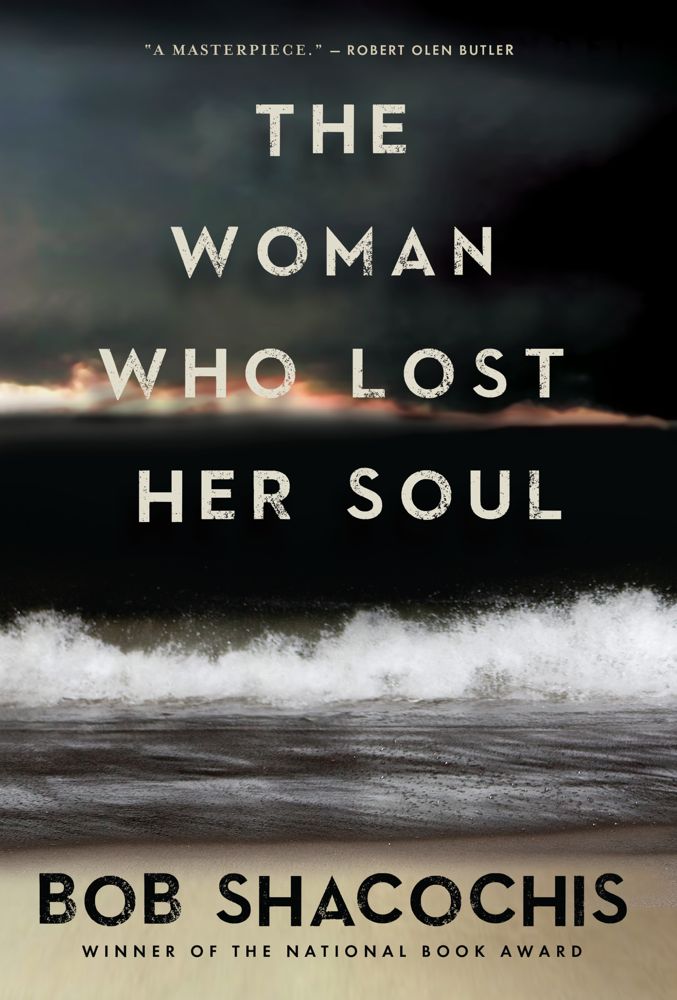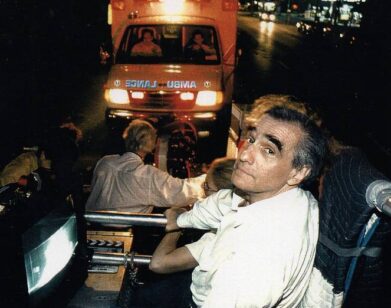Bob Shacochis’ Second Act

I met Bob Shacochis in April, 1985 when he had a broken right hand. Our friendship, now nearing its third decade, began when I helped arrange a book signing for him at a Denver bookstore where I worked. His first book, Easy in the Islands, had just been released, and I was amazed by his ability to conjure, in these beautiful short stories, a unique Caribbean world in which this landscape and predominantly native voices inhabited my mind for weeks. Bob impressed everybody immediately, compensating for the broken hand (skiing accident?) by signing with patient, un-wobbly left-hand inscriptions.
There were no contemporary stories quite like these, and Easy received the National Book Award for First Work of Fiction [now a non-existent category]. Shacochis’ stories in The Next New World (1990, awarded the Prix de Rome) staked new fictional ground, conjuring a range of vistas and characters away from the Caribbean. His first novel, Swimming in the Volcano, a National Book Award finalist in 1993, evolved amid globe-trotting magazine assignments that ranged from climbing Mt. Ararat to exploring Russia’s Kamchatka peninsula to reporting from a war zone. Not to mention, he’s a gourmet cook whose “Dining In” columns for GQ in the 1990s morphed into his book, Domesticity (1994).
Shacochis’ new novel, The Woman Who Lost Her Soul, fuses his narrative versatility and his deep understanding of multiple cultures into what Robert Olen Butler calls his magnum opus. Its suspense revolves around the murder in Haiti of stunningly beautiful Jackie Scott, but before its far-reaching web of interactions ends, it brilliantly unveils the darker regions of human sexuality, evoked inside a historical build-up of international political deceit—deceit with present-day consequences. They are realistic consequences, in fact, that have arguably landed on the doorstep of America in 2013.
JEFFREY HILLARD: So Grove Atlantic is publishing your first novel since Swimming in a Volcano in ’93. How does it feel to be back with your second novel?
BOB SHACOCHIS: I don’t know. What is the range of feelings that are available?
HILLARD: You wrote a lot of nonfiction in the past 20 years, with a definitive non-fiction book in 1999, The Immaculate Invasion. How did you juggle the non-fiction and your work on the Woman Who Lost Her Soul?
SHACOCHIS: There was no juggling. When one projected ended, the other one began. Since I started working on this novel in 2002, I turned down most of the non-fiction work that was offered to me—including covering the wars in Iraq and Afghanistan, which I guess I would have liked to have done, simply because of the significance of those events. I had already been in two earlier war zones; so going to war was not exactly an original or exotic experience for me. I was devoted to getting the book done and I knew I would never get it done if I kept running around the world. Also, domestic problems kept me at home. Most of my non-fiction involves overseas travel and I couldn’t do that because my parents were very ill—terminally ill—and my wife became very sick as well. There were numerous other domestic responsibilities that kept me in my fiction-writing chair.
HILLARD: How does it feel to be back with your second novel?
SHACOHIS: I don’t know. In some ways it’s business as usual and that’s great. I’m asked all the time, “Doesn’t it feel great to finish the novel?” And the answer to that is, “No.” It’s sort of a loss to stop a 10-year project, which is an imaginary project in the sense that it’s a work of my imagination. The people who I’ve lived with for 10 years in my imagination are now sort of defunct. To lose them is rather a mournful process—it’s not a relief. On some show the other day, I was listening to Daniel Day-Lewis talk about his work and channeling Lincoln for Spielberg’s movie. He immersed himself in the character of Lincoln when he was working on the movie and, when the movie was over, he felt a great sense of grief in his disconnection and detachment back into his own character. That’s how I felt with finishing this book. It’s a sense of loss but at the same time it’s a sense of long-awaited accomplishment—just finishing something.
HILLARD: At 34 you won the National Book Award in 1985 for First Work of Fiction.
SHACOCHIS: An award that no longer exists.
HILLARD: Right, but it’s still a National Book Award. The spotlight expanded very quickly. John Irving was a major enthusiast of your work, even before the National Book Award. What was that time like when your star really rose, especially after that award?
SHACOCHIS: It was too long ago. I don’t remember. [laughs] That was how many years ago? 30 years ago? I’m sure it was grand. Doors opened. Once Easy in the Islands came out, I got calls from editors from all the major magazines that I had lusted to work for since I was in journalism school in the early ’70s at the University of Missouri. In that interim between getting a Bachelor of Journalism degree and finally getting magazine assignments, it seemed like I was doing the worst jobs out there. [I was] a copy boy at the Palm Beach Evening Times where I would tear the copy off the wire at four o’clock in the morning and spike it on an editor’s desk. I was an agricultural journalist in the Peace Corps in the Caribbean. It just seemed like it was going to take me forever to pay my dues as a journalist to get to do what I really wanted to do, which was write long-form narrative for the general interest magazines—the really good ones. So I took a bigger gamble and said, “Well, maybe if I can make a reputation for myself as a fiction writer I might be able to do the journalism that I really want to do.” It was backwards because mostly you have guys sitting at their desks at a newspaper wishing that they could go out and write a novel. I was writing a novel—or writing short stories at least—wishing I could do magazine pieces.
HILLARD: When you started working on The Woman Who Lost Her Soul in 2002, how much of it had you already conceptualized?
SHACOCHIS: Writing is a process of discovering. I could never outline a narrative; that just sounds boring. There’s no joy of discovery in what you’re doing if that’s your strategy. When I started in 2002, I wanted to write a murder mystery. I wanted to write a murder mystery because I really wanted to make some money. It sort of organically grew into something that also fit that scheme—an espionage thriller. It’s a great way to get two different chances to get paying audiences. Halfway through, I realized what I really wanted to do—besides try to be a mercenary—was something with a bit more gravity, and that was a daddy-daughter book. Ultimately, that’s what the book is to me, a daddy-daughter book with the ornaments of a murder mystery and an espionage thriller making it glitter.
HILLARD: I totally agree. I know you’ve said that when you create a character you have an image of someone in mind, but not necessarily the story of a real person. Did you have role models in mind for The Woman Who Lost Her Soul? Some of the character histories are significant.
SHACOCHIS: What I do is, I’m like a disease that infects real people and I take them over. We can start off in a very journalistic mode describing a character and observing a character—and that’s what I do with a lot of characters in that book. And then my imagination eats them alive.
HILLARD: Was Jackie Scott the only character?
SHACOCHIS: No, the FBI special agent, Conrad Dolan, he’s a real guy. Eville Burnette, the Special Forces operative in my book, is two guys. To a very small extent the human rights lawyer, Tom Harrington, is me at the beginning and then he’s not me at all—not even close.
HILLARD: One constant in the novel is these rich and haunting contrasts. For example, I think of Tom early on. He’s at the Hotel Oloffson and, in a particular moment, the beauty of Haiti is evoked—it’s like paradise fraught with corruption. Throughout the novel, you really expose the depth of human vulnerability. Was that something you were going for?
SHACOCHIS: The language that you’re using implies that I’m in control of what I’m doing or know what I’m doing, which I’m not. The illusion of control has to be there, but mostly I’m following characters and the consequences of their own decisions, because a lot of the time they made decisions about what to do or how to behave that I had no idea were coming down the pike. As I would sit and try to inhabit a character, they themselves in my imagination would have quite a bit of free will. I know that sounds stupid. But for any artistic person who creates imaginary people, the art is like inhabiting the life and mind of a seven-year-old child with imaginary friends and imaginary events and imaginary grace and imaginary tragedy. Within that alternate universe, the characters do have quite a bit of free will. I know it’s happening in my mind and my mind alone, but they seem to have their own ability to shape their destinies. So I’m not shooting for anything. If the characters are vulnerable it’s simply because they’re very human. That would be the goal: to make them human. You decide which characters you want and then do the best you can to bring their humanity to the forefront in the context that you place them in—the crises in which you’ve placed them.
HILLARD: You mentioned language and that it’s incredibly important to you in creating a character’s voice. When do you know that you’ve gotten character’s voice exactly right?
SHACOCHIS: When someone reads it and tells me. [laughs] Someone else has to tell me that it’s right. All I can do is shoot at the target. But it’s an incantatory process. When I’m in it, I’m in another place that doesn’t connect very well with my everyday life or the people around me. When I come out of that place, back into my everyday life, I don’t really remember a whole lot. It’s like I’m in a dream state—a trance.
HILLARD: The novel’s cover art is just exquisite and I think it reflects a lot of the novel. How did you choose that particular cover?
SHACOCHIS: It was the first one and it was the best. I didn’t suggest any cover art. In fact, I just wanted a typographical cover because that sort of says, “Big book” or “You’ve come of age,” or “You’re a big boy now.” Let’s get the name of the title and the name of the author as big as we can get them on the cover. But the publisher at Grove Atlantic said he wanted more atmosphere and I was surprised when I saw the concepts that the artist had come up with. My reaction was, number one, that’s perfect, and number two, I can’t believe that someone’s read the book because there’s no way he or she could come up with that cover without reading through the book!
THE WOMAN WHO LOST HER SOUL IS OUT NOW. FOR MORE INFORMATION, VISIT THE GROVE ATLANTIC WEBSITE.






